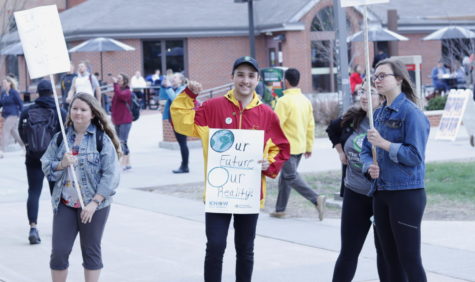Master Tibetan Buddhist shares nature of his religion
October 31, 2001
The 20 people in the small room are obviously praying.
They all sit or kneel silently on cushions and chairs, heads bowed, hands clasped.
It is so quiet you can hear the sound of a match ignite.
While the others continue to pray, a man puts the flame to a stick of incense. He then clasps his hands in prayer, incense between them. He places his thumbs against his forehead and puts the stick of incense in a pewter jar filled with sand.
The smoke begins to swirl in the air, and the subtle scent of sandalwood begins to drift around the room.
If you take away one man dressed in maroon robes and the golden statue of Buddha sitting on the table, it would be difficult to tell what religion the people in the room follow.
These people are members of The Ames Karma Kagyu Study Group, which studies Tibetan Buddhism.
They are waiting for Bardor Tulku Rinpoche, a reincarnated teacher and master of Tibetan Buddhism.
This is Rinpoche’s third visit to Ames. He was here for the first time in 1997 and came again in 1999.
This visit is a stop on a national tour of American affiliates of Karma Triyana Dharmachakra, part of the religion under the protection of Karmapa-based at a monastery in Woodstock, NY, said Tim Mullaney, coordinator for the Ames group.
Tuesday morning, from the living room of a house on Burnett Street, Rinpoche spoke about the practice of Nyungne – pronounced Noon-yay – an advanced practice of Buddhism.
The stairs leading from the second floor creak under the weight of the respected teacher. As he enters the room from a side door, everyone rises, presses their hands together and bows in a traditional greeting to Buddhist masters.
Rinpoche is dressed in the traditional clothing for Buddhist leaders – a maroon robe draped over his left shoulder. He nods to the audience and sits.
Everyone else follows his lead.
He begins with the Mahamudra Lineage Prayer, a traditional prayer that asks for a blessing so people may follow the “tradition and example” of the Buddha.
The prayer, spoken in Tibetan, sounds like a consistent humming, each syllable indistinct from the ones before and after it.
The prayer ends, and Rinpoche begins to talk about the Nyungne practice.
“The thought you are listening to . establishes all beings in a perfect awakening,” Rinpoche said through a translator.
“With almost all mantras, the benefits are said to be limited to that particular practice. But not in the form of Nyungne we practice.”
Nyungne is an advanced practice that ties together meditation, visualization and fasting to help followers develop compassion for other beings, Rinpoche said.
Mullaney said Nyungne seems to help people understand more about the Buddhist religion.
“It is much easier for people unacquainted with the idea to . meditate and find compassion,” Mullaney said.
Compassion for others is one of the primary teachings of the Buddhist religion, he said.
“Buddhism is about wanting to find happiness for all beings,” Mullaney said. “Also . cultivating the ability to fulfill others’ need to be happy.”
The quest for enlightenment, ridding oneself of ego and finding infinite wisdom and compassion are the aims of the religion.
Buddhists believe all beings search for happiness, but one achieves the right to gain enlightenment only in human form.
“One becomes human, because one has accumulated virtues from previous lives,” Rinpoche said. “It is precious human birth, because we have the freedom to practice spirituality.”
He said when one achieves enlightenment and Buddhahood, “the result is the eradication of ignorance, the perfection of wisdom . and the full discovery of one’s own basic nature.”
The Nyungne practice simply quickens the pace in the quest for enlightenment, Mullaney said.
“It’s quite involved,” he said. “It’s regarded as a powerful experience for people to discover compassion. People transform very quickly as they do it.”
Mullaney said Rinpoche’s presence in Ames is “priceless.”
“As a realized being, he has seen his nature is basically enlightened,” he said. “He can help others find themselves, too.”
Mullaney said finding compassion for others is especially important today.
“In the dark times we’re entering, there’s a great need to cultivate compassion when times have turned like they have,” he said.
“It’d be very easy to lose our hearts in feelings that have been appeared.”
















